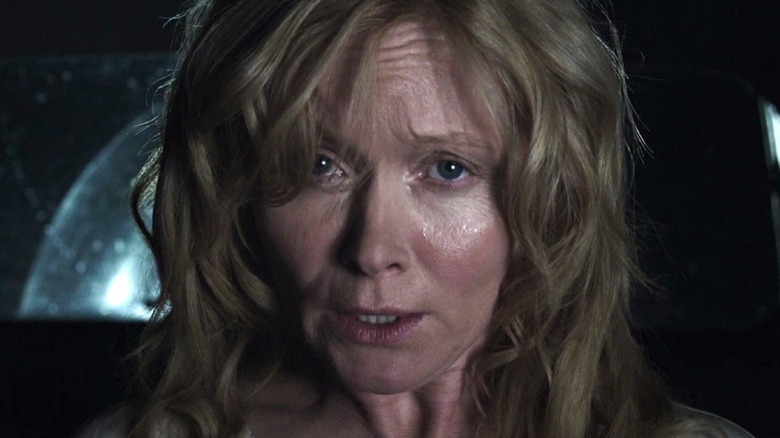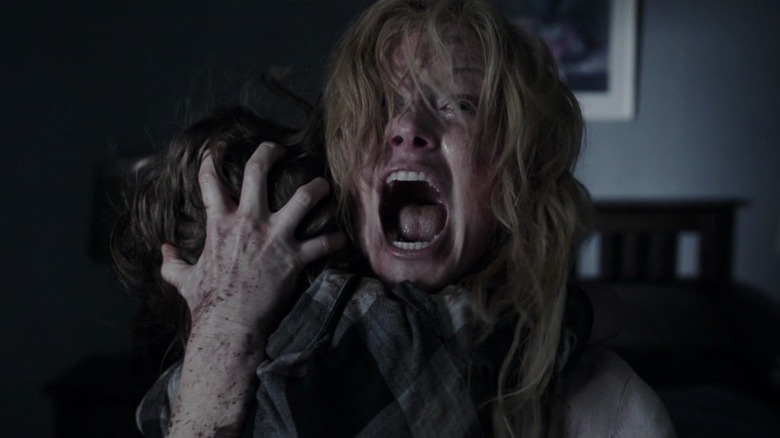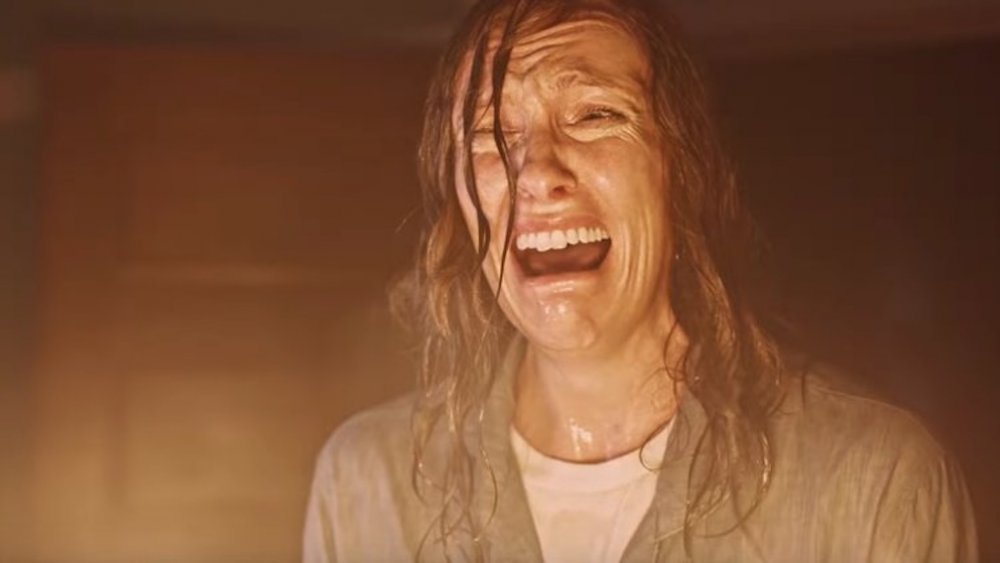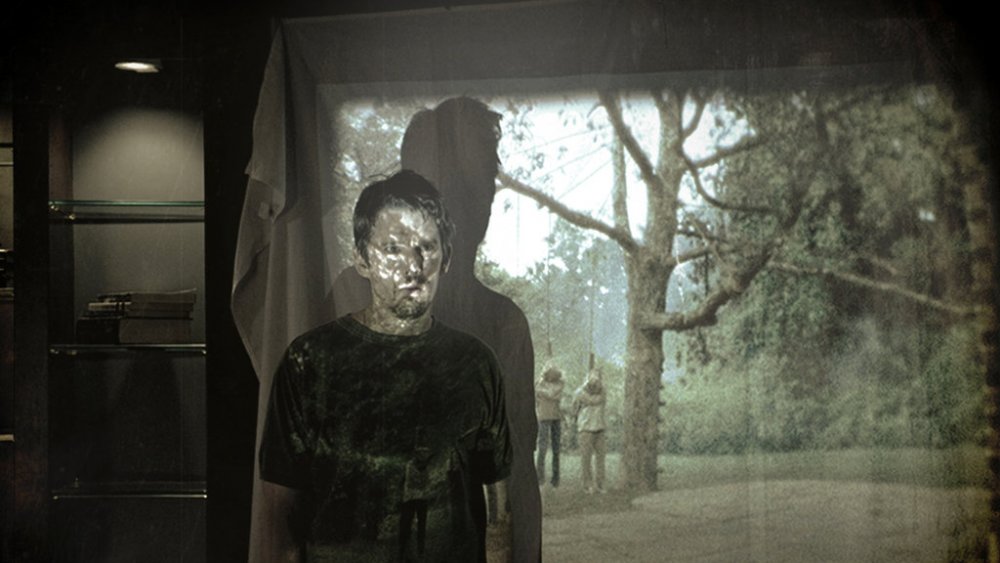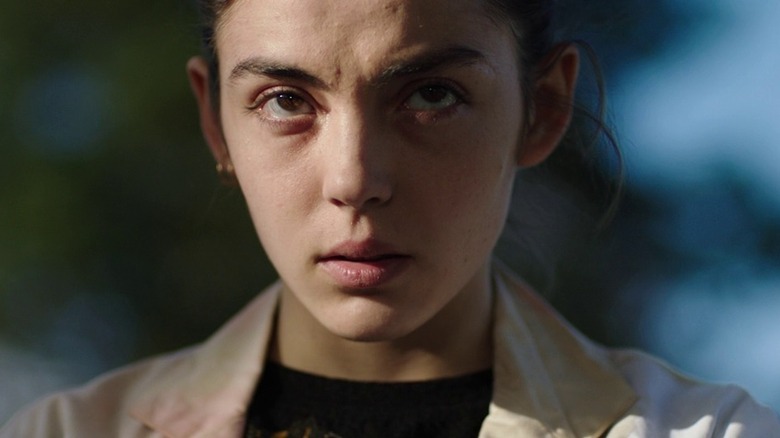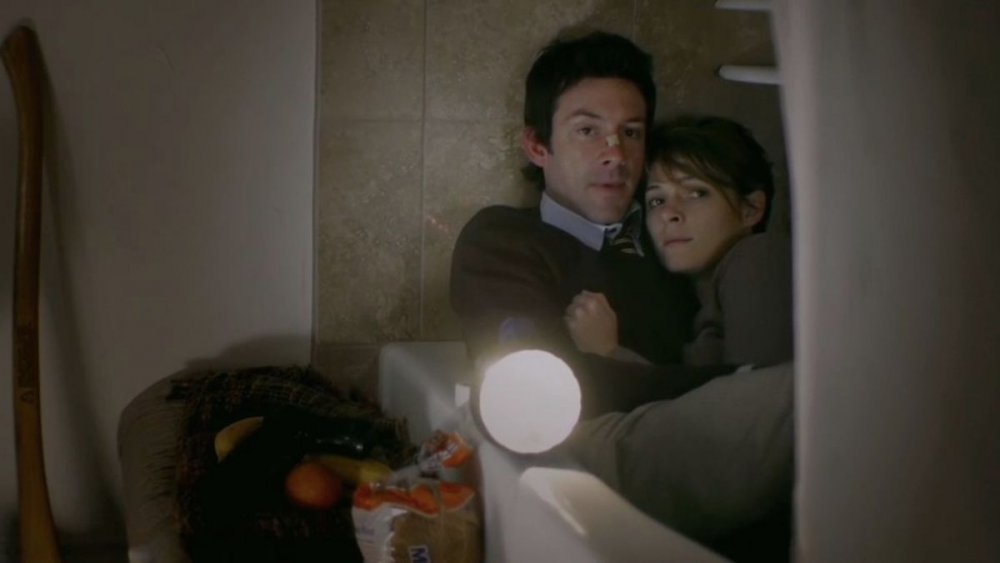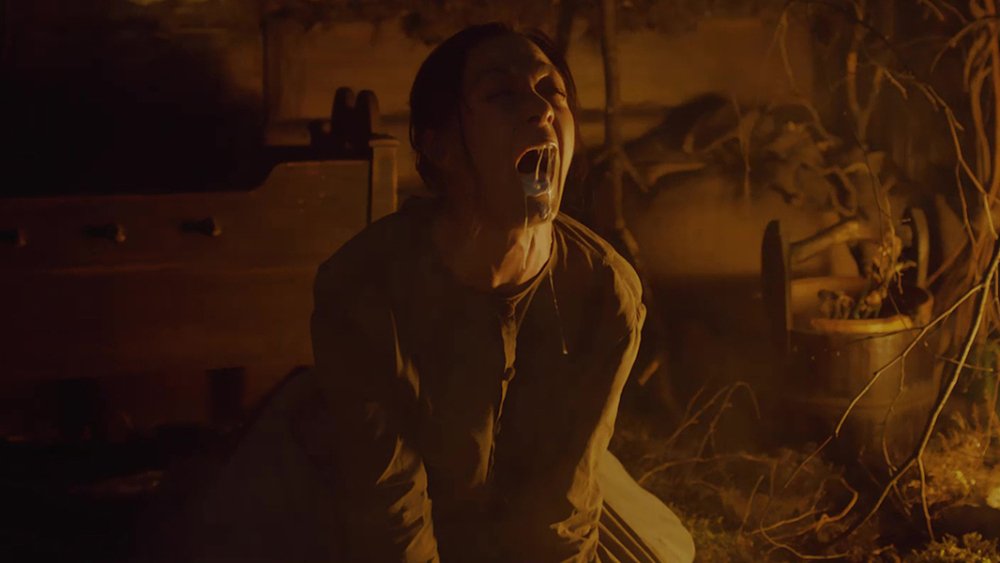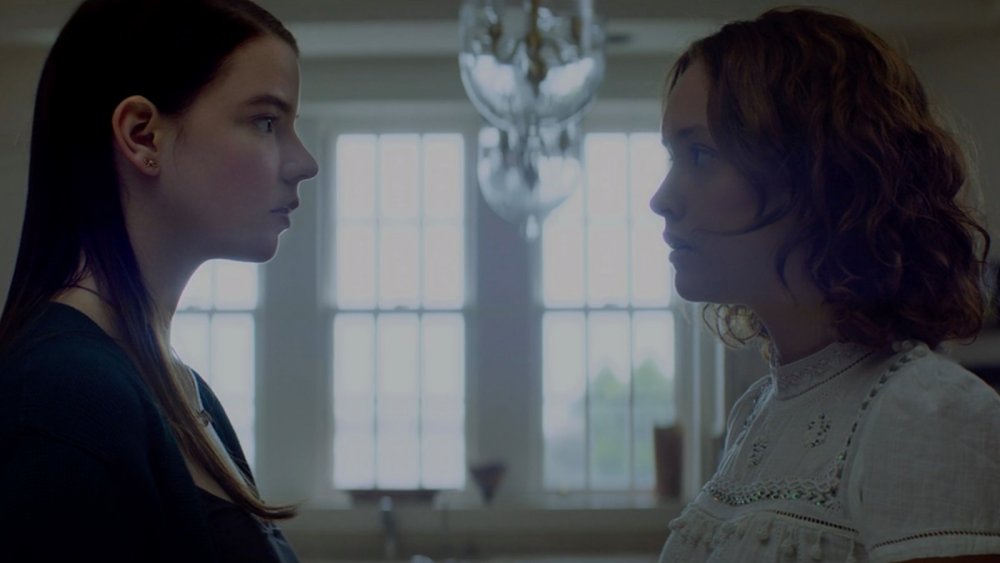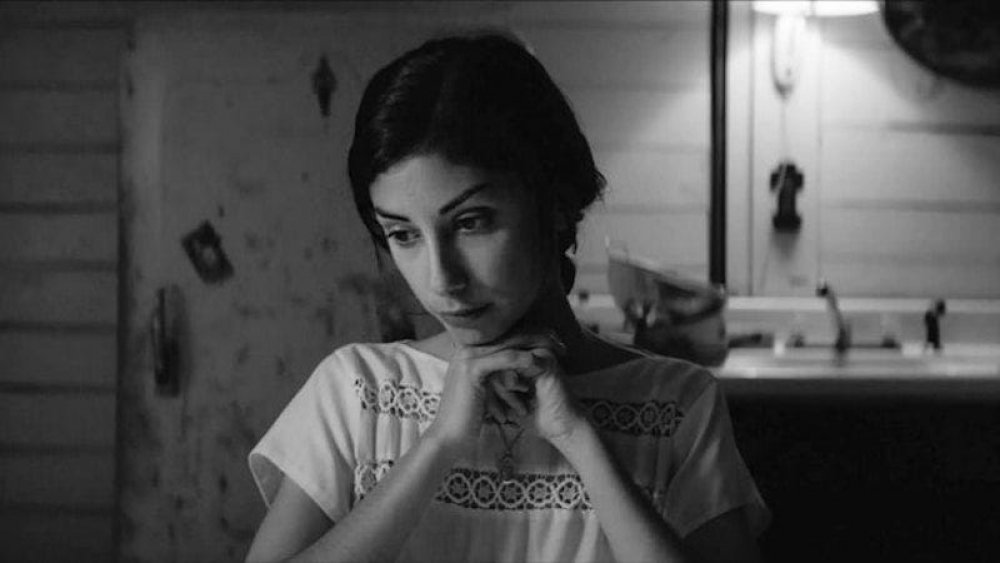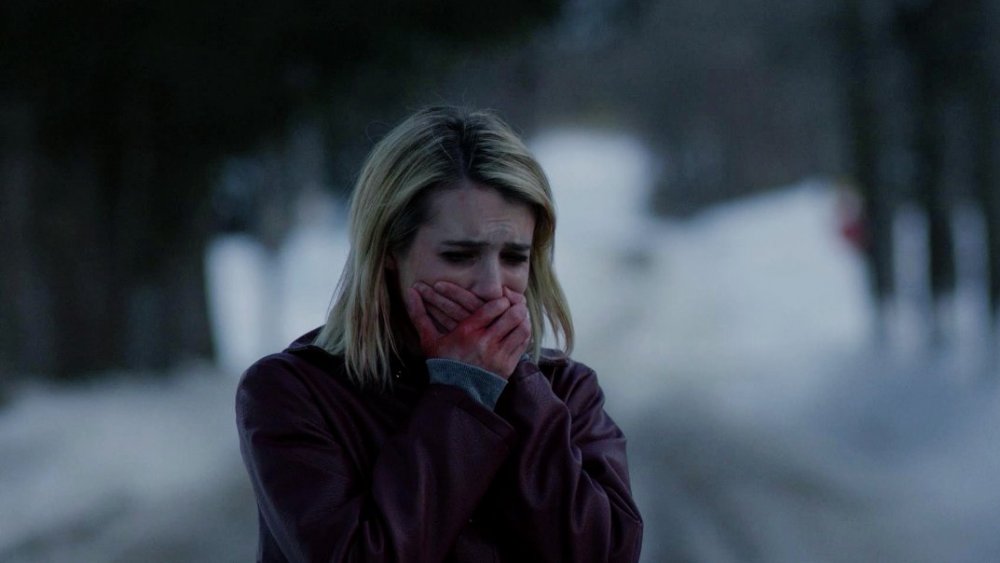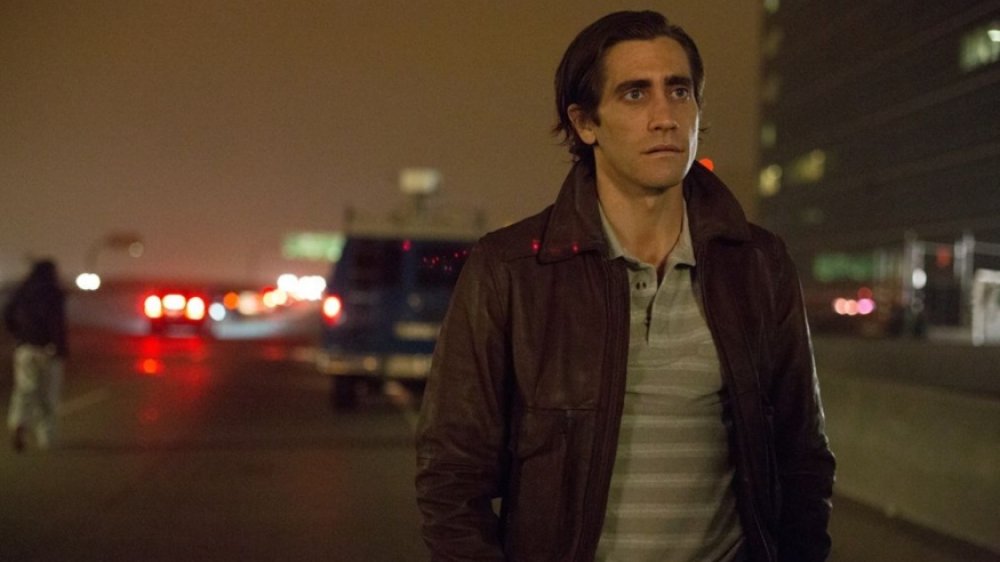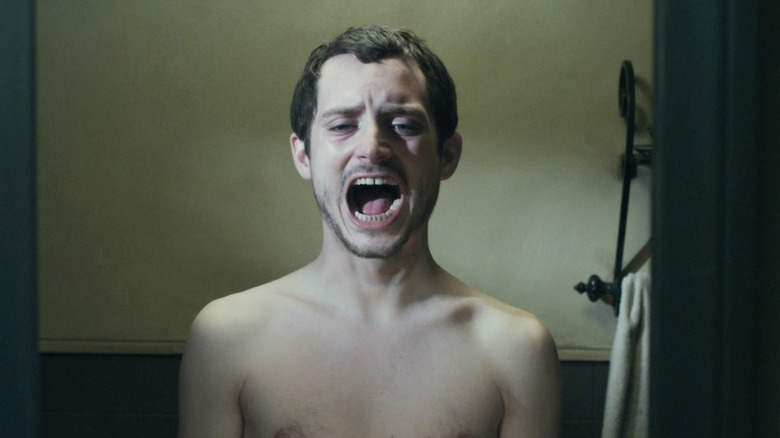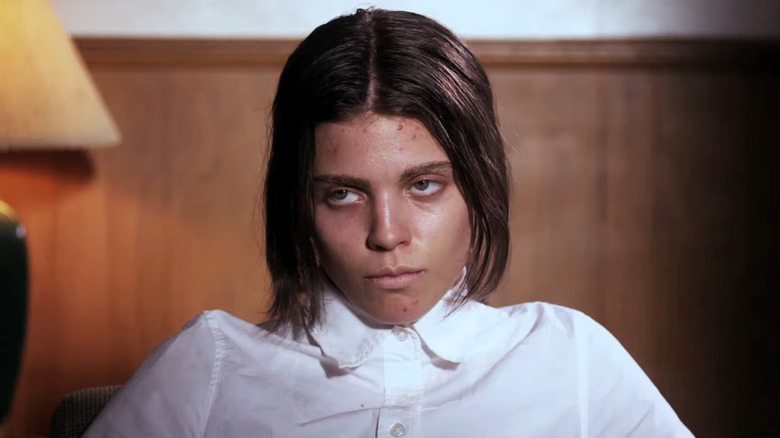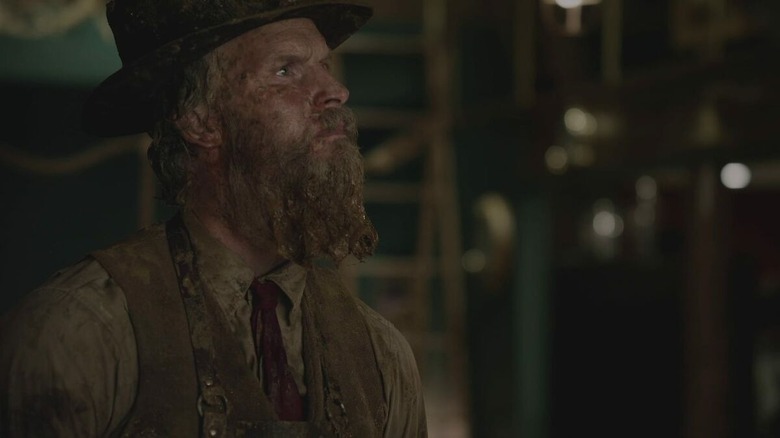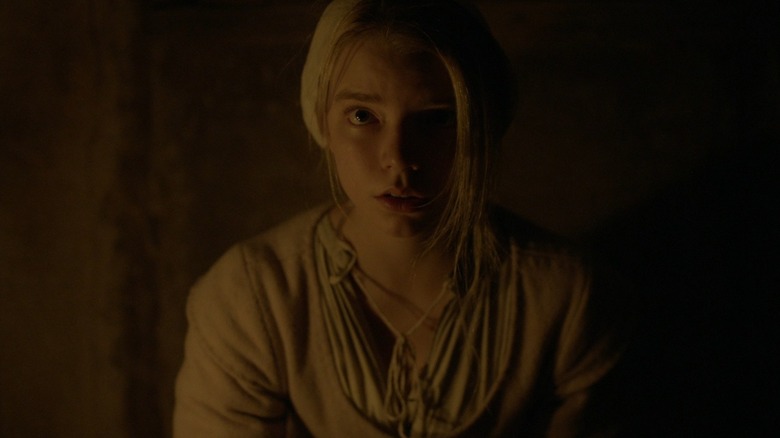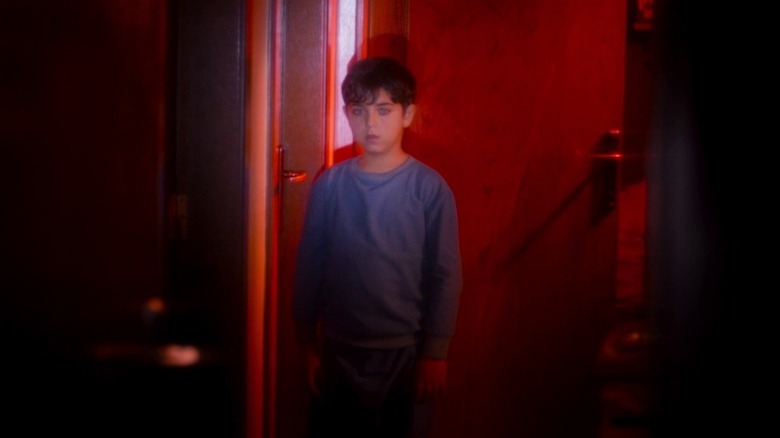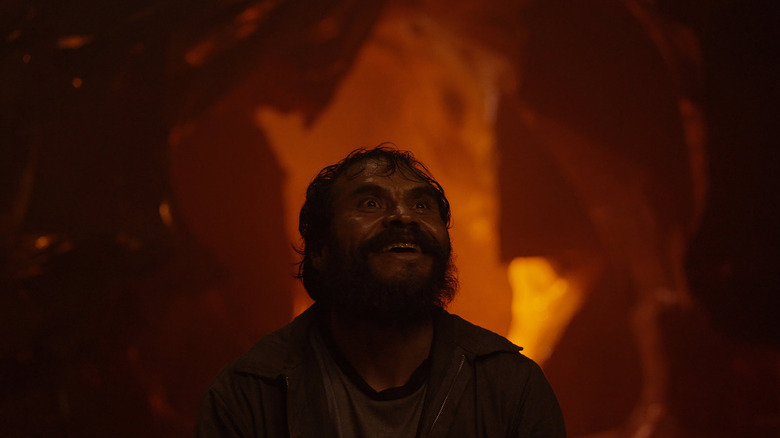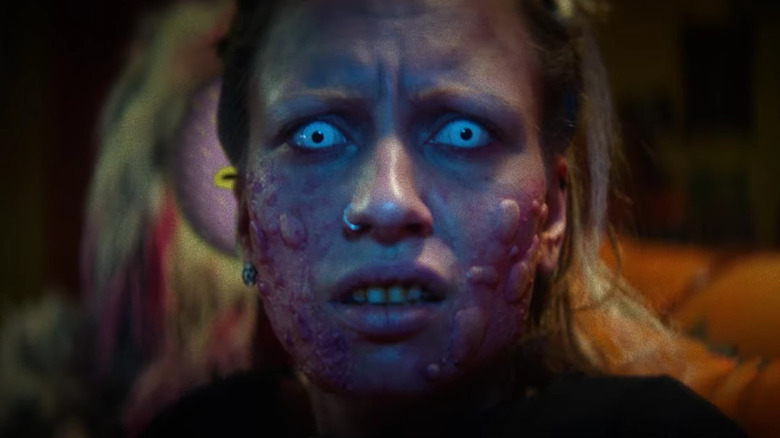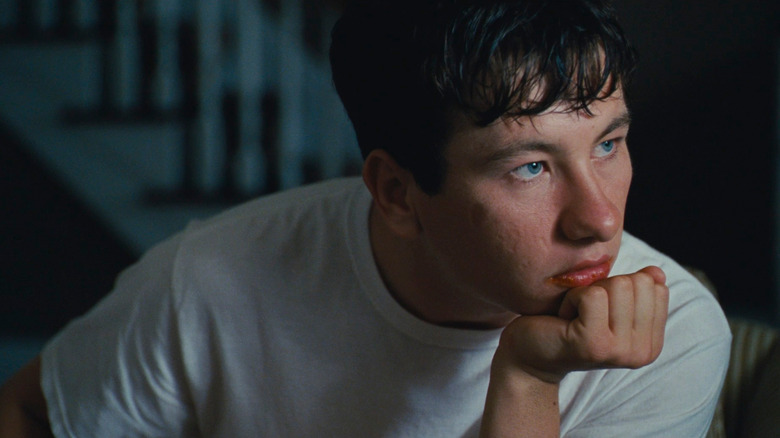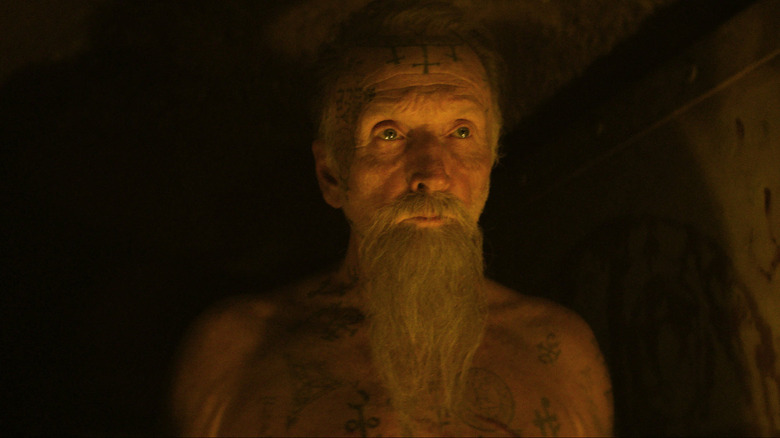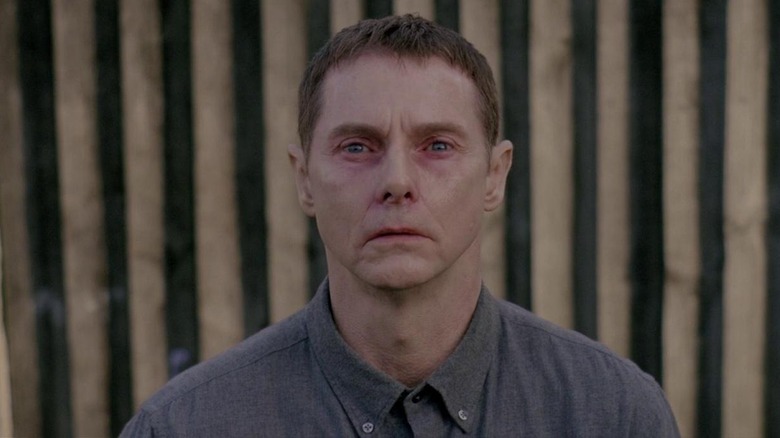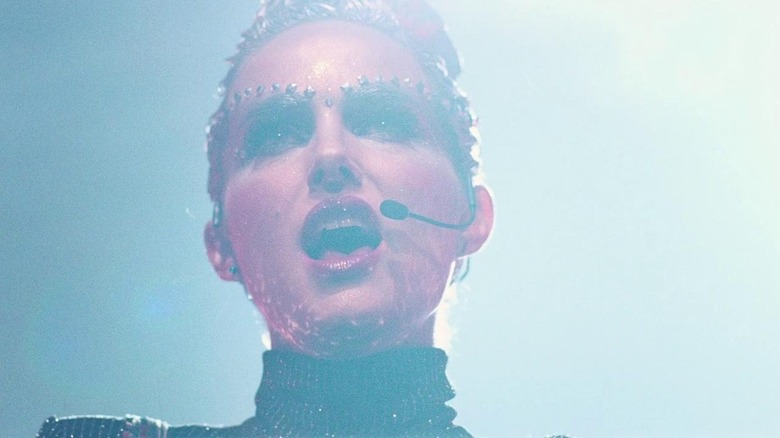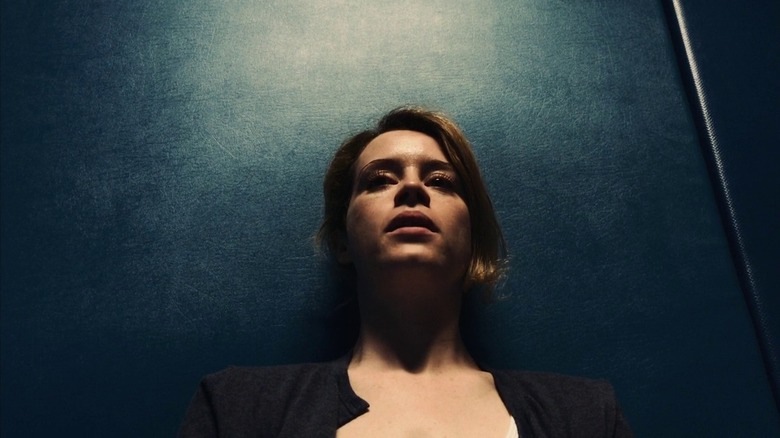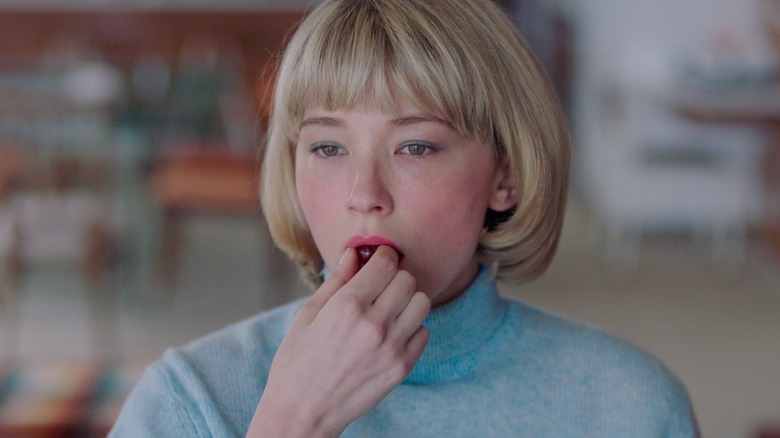The Most Disturbing Movies Of The Last Decade
Call them horror movies or thrillers or psychological dramas with socio-sexual undertones — the movies that have brought the madness and the menace over the past 10 years have done so with arguably unparalleled insight and artistry. As such, it hardly seems fair to even attempt to assemble a single list of the past decade's best and bleakest, but that's just what we've done here.
These are the films that will keep you awake long after the credits have rolled — perhaps because you're deep in thought about the truly messed-up stuff you've just witnessed or perhaps because you're too terrified to close your eyes and fall asleep. From wildly unconventional sci-fi creepers to twisted tales of demonic possession to experimental films that push the boundaries and then some, we've got a little something to unnerve even the savviest of shock-adoring cineastes. These are the most disturbing movies of the last decade.
Under the Skin (2014)
If you've entered the earth-shattering rabbit hole that is Jonathan Glazer's music video oeuvre, you already know the director has a particular penchant for pushing boundaries with unsettling imagery and ominous tones. One might even say Glazer revels in the bewildering as few directors dare. It's only natural, then, that he'd continue weaving challenging images and disturbing themes into his feature films.
Few would argue that Glazer hadn't already tested some serious boundaries with 2000's searing crime drama "Sexy Beast" and 2004's psychosexual mystery "Birth," but neither of those films could even begin to prepare us for how far Glazer would push things with 2013's "Under the Skin."
It's a full-on assault on the senses from its opening moments to its last. It features a revelatory performance from Scarlett Johansson that's about as far from the MCU as you can get. And that there's a scene about halfway through this movie that's so relentlessly unnerving you'll struggle not to turn it off. Keep watching, though, because even if "Under the Skin" often feels like a movie you survive more than watch, crossing the finish line on this extraterrestrial odyssey is also one of the most rewarding cinematic experiences you'd ever hope to endure.
The Babadook (2014)
When the director of one of the greatest horror movies in cinematic history claims your film is the scariest movie they've ever seen, you know you've done something special. So it was that when the legendary William Friedkin — the man behind "The Exorcist" — started telling people that Jennifer Kent's 2014 indie "The Babadook" "will scare the hell out of you." Genre lovers, the world immediately took notice.
And Friedkin wasn't lying. Possessed of a singular sense of eerie, "The Babadook" tells the story of a single mother struggling to raise a son with some serious emotional issues. Of course, given that the woman's husband died en route to the child's birth, it's clear that both mother and son have some deep rooted issues to work through, issues that complicate their lives further when a horrifying children's book called "Mister Babadook" appears in their home.
As Kent slowly begins to unwind her unholy creepfest, a surprising narrative begins to take shape — one that insightfully explores heavy emotional themes about surviving trauma and the struggles of being a single parent with a devastatingly unrelenting case of depression. As it happens, "The Babadook" is also a first-rate monster movie with more genuine scares than your average genre fare. Yes, "The Babadook" will "scare the hell out of you," but it'll leave your heart in your throat too.
Hereditary (2018)
According to writer-director Ari Aster, his brutalist 2018 shocker "Hereditary" is really just a little family drama at its core. But that's sort of like calling "Jaws" a charming tale of fish out of water. So yes, while we really cannot argue that "Hereditary" isn't a family drama, we also want to be crystal clear that "Hereditary" is not just a family drama.
Still, true to Aster's statement, "Hereditary" initially presents itself as an atypical sort of indie drama about a family in grief. As the film unfolds, a deep, dark past begins to rise to the surface, and "Hereditary" spirals giddily into a pulse-pounding supernatural nightmare simply you have to see to believe. Just be warned that you'll never be able to unsee "Hereditary."
In case you haven't experienced it for yourself, we'll simply say you'll know the precise moment when Aster flips the proverbial switch from family drama to full-blown family tragedy. You'll know because the moment it happens is easily one of the most shocking in the history of cinema. Aster is just getting warmed up in that moment, and "Hereditary" is about to get darker and heavier in ways you simply cannot fathom. It's a brutal, exhausting affair, but if you manage to stick with "Hereditary," you'll bear witness to not just one of the great horror movies of the decade, but of all time.
Midsommar (2019)
With Ari Aster's "Hereditary" immediately raising the bar for genre filmmakers young and old, it seemed unlikely that anyone would top the film in terms of unadulterated, head-rolling shock value for the foreseeable future. Seems the only person capable of even coming close was Aster himself. While "Midsommar" may not quite match "Hereditary" in terms of shocks and scares, it may well be the better film in terms of soul-crushing emotional impact and mercilessly ominous energy.
Of course, to hear Aster tell it, "Midsommar" is a relatively straightforward "breakup movie." Believe us when we say that "Midsommar" is a "breakup movie" in the same way that "Hereditary" is a "family drama." Which means that it's not really a breakup movie at all.
The relationship in question belongs to Dani (Florence Pugh) and Christian (Jack Reynor), and if ever there was a couple in need of a breakup, it's them. But nothing is ever that easy in the worlds of Ari Aster, and from the torturous opening moments of "Midsommar," the director is out to turn the screws of the pair's doomed relationship in increasingly twisted ways. By the time the couple and their pals get to the titular Swedish festival, fates are effectively sealed — though nothing can even remotely prepare you for the gory, sun-drenched mayhem Aster has in store for the rest of the film.
Sinister (2012)
Prior to helming 2016's "Doctor Strange," Scott Derrickson spent the decade prior making a name for himself among genre enthusiasts. He caught our attention with 2005's possession drama "The Exorcism of Emily Rose," but it was 2012's "Sinister" that proved Derrickson a horror purist of the first order. Though too many slept on "Sinister" upon release, it's still one of the more genuinely effective thrillers you'll ever see — even if it admittedly leans a little too often on classic horror tropes.
The film follows the story of a washed up true-crime author (the always great Ethan Hawke) who moves his family into a house where a grisly crime has taken place so he can research the events up close and personal. Unfortunately, when he finds an old box of Super 8 snuff films in his attic, well, the man and his family get a little closer to the truth than anyone would've wanted.
Be warned that those 8mm films are likely to cost you a few nights of sleep. But they're only a small part of what makes "Sinister" such a black-hearted delight. The film is at its best when wallowing in ominous tones and gritty gothic imagery, and Derrickson makes the most of "Sinister's" menacing aura, taking a perverse sort of pleasure in the film's slow-burn approach and pulling the blood-stained rug out from viewers in a finale that'll have you peeking through your sweaty palms in unfettered fear and dispiriting anticipation.
Raw (2016)
It can often be quite difficult to decipher exactly what it is about a movie that gets under your skin. In the case of Julia Ducournau's astonishing first feature "Raw," it's a little easier to figure out, because Ducournau essentially spends the entirety of the film's 100-minute runtime unleashing a near-constant deluge of sounds and images and scenarios that could potentially set one off.
That's not to say "Raw" is a mile-a-minute, shock-for-the-sake-of-shock gorefest. Quite the opposite, in fact, as Ducournau takes a decidedly steady-handed approach to her film, doling out the shocks as they come while quietly delivering a vicious, unapologetically sexy college drama that legitimately turns the genre on its head.
We should tell you upfront that the film follows the trials of a young university student who unexpectedly finds herself with an insatiable appetite for human flesh. So even if "Raw" isn't the all-out bloodletting you might expect from such a setup, much of the action is likely turn your stomach on its head as well. But instead of reveling in gory effects and schlocky scares, Ducourneau takes a humanistic approach to "Raw's" shocking story, only using the gore to bolster a witty, insightful character study that becomes — against all obvious odds — a compelling (if frequently appalling) coming-of-age drama about cannibalism.
Upstream Color (2012)
There are filmmakers who rely on jump scares and fake blood to get under an audience's skin, and those who believe austere imagery, ominous overtones, and the illusion of the sinister are just as effective. Shane Carruth is of the latter school, and "Upstream Color" more than proves this.
Now, we're not going to bore you by trying to explain what "Upstream Color" is about, if only because entire thesis papers could be written on that particularly slippery subject. If we're being completely honest, we'd offer that "Upstream Color" is a film less concerned with what it's about than what it can make you feel — and there's seemingly no end to what Carruth can achieve on that particular front.
To that point, we'll simply say that the film follows a woman (the brilliant Amy Seimetz) who — after being parasitically hypnotized by a thief and having her entire life looted — is left with a ruined future and no memory of what happened. She meets a man (played by Carruth) with a similar story, and as they futilely try to piece together their individual miseries, they stumble upon a truth beyond imagination. What follows is nothing short of a deeply paranoid cinematic assault on the senses that simply has to be experienced to be believed. Just know "Upstream Color" is a decidedly unnerving experience that will have you scratching your head for days, months, even years after the credits roll.
Hagazussa (2019)
Set in an isolated, mountainous region of Europe circa the 15th century, Lukas Feigelfeld's gothic nightmare "Hagazussa" propels itself forward at a sub-glacial clip that would certainly seem geared toward mimicking the pace of life in such a region. While the film wholly succeeds at capturing the slow pace of life in the hills, Feigelfeld also uses that pacing to cast a hypnotic sort of spell over viewers.
That won't be broken until the film's stomach-churning final moments. En route to that beyond brutal finale, Feigelfeld uncorks a pitch-black folk tale about a single woman with a pagan past trying to survive the wilderness and raise her infant daughter in relative peace. Of course, when your neighbors live in constant fear of magics and spirits and witchcraft, the natural world is far from your most dangerous foe.
Fueled by a relentlessly paranoid sense of calm and enough gothic imagery to spook Mary Shelley, "Hagazussa" proves itself a singularly sinister slice of genre cinema. While it's certain to test the patience of those seeking to sate their bloodlust with schlocky scares, Feigelfeld brings the hammer down with such visceral force in "Hagazussa's" final act that the film is certain to haunt the minds of any viewers who make it to the end for years to come.
Thoroughbreds (2018)
If history has taught us anything, it's that Hollywood loves a good story of rebellious, whip-smart youths generally running amok. While classics like "Rebel Without a Cause," "A Clockwork Orange," and "Spring Breakers" have kept the bar for such fare raised perpetually high over the years, Corey Finley's "Thoroughbreds" proves there's still room for one of cinema's favorite subgenres to grow — even if it's clearly destined to grow darker these days.
At the center of Finley's pitch-black dramedy is a pair of upper-crust Connecticut teens who exist on opposing ends of the emotional spectrum. Lily (Anya Taylor-Joy) feels everything too strongly, while Amanda (Olivia Cooke) is incapable of feeling anything. When the estranged friends are reunited in Finley's narrative, they find they're each losing control of their lives, and are uniquely equipped to help each other out.
That help comes at a cost, as the girls' one shot at liberation involves a deviously violent plan. While it propels the film's narrative forward, it's hardly the focal point of the film, with Finley instead using it to craft a penetrating character study about a pair of brilliant but tragically fractured young minds.
The Eyes of My Mother (2016)
Horror movies are essentially designed to take audiences into the dark corners of the world and show them the unspeakable things that tend to happen there. Sometimes that dark corner is a physical place (see "The Texas Chain Saw Massacre"). Other times it's a place in the mind (see "The Cell"). Nicholas Pesce's grisly debut "The Eyes of My Mother" is the rare case where mind and place converge to explore one of the darkest corners ever captured on film.
"The Eyes of My Mother" doesn't start out that way. In fact, the film's opening moments are surprisingly serene, with a girl and her family living in relative peace on an isolated farm. But Pesce takes a sledgehammer to that idyllic life early in the action. When he does, "The Eyes of My Mother" goes dark in ways that words simply cannot convey — ways that ensure the film will stay burned into your brain for all eternity.
We'd wager you've heard whispers of the film's vivid depictions of violence, torture, and gore. While the film (shot in stunning black and white) is unflinching in its depiction of such acts, the most gruesome deeds tend to occur offscreen — though that only heightens viewers' reactions. Pesce further deepens the darkness by using the fragile, emotionless beauty of star Kika Magalhães against viewers in service of turning "The Eyes of My Mother" into a piercing character study about trauma, and soul-consuming loneliness.
The Blackcoat's Daughter (2015)
Speaking of soul-crushing loneliness, it's the main culprit at work in Oz Perkins (son of "Psycho's" Anthony Perkins) relentlessly bleak possession film "The Blackcoat's Daughter." That being said, there is a mysterious evil force running amok in the film that may or may not have claimed the soul of "The Blackcoat's Daughter" central character and forced her into performing unconscionable acts of violence.
Demons and possessions aside, loneliness and isolation really are the driving forces at play in "The Blackcoat's Daughter." The film unfolds largely on the grounds of an all-girls Catholic school somewhere in the far distant north. When two of the girls (Kiernan Shipka and Lucy Boynton) are stranded there over winter break (one believing certain calamity has befallen her parents, the other facing a difficult choice of her own), things get weird very quickly with the younger girl apparently being possessed by some unseen demonic presence.
Meanwhile, a parallel narrative finds a grieving couple picking up a desperate young woman (Emma Roberts) at a bus stop, not knowing she's an escaped mental patient. These narratives will eventually converge in wickedly clever fashion, and to utterly heartbreaking effect. Perkins controls the action every step of the way with a steady hand and singular vision, building a suffocating sense of atmospheric dread into every frame of the film. In doing so, he delivers a deeply humanistic supernatural tragedy, and one of the darkest possession films we've ever seen.
mother! (2017)
There's a general upping of the ante built into narrative framework of most horror movies, because said movies require the action get bloodier and more brutal simply to raise the stakes for characters trapped within. Darren Aronofsky's "mother!" is a horror film so wholly consumed by the concept of upping the ante that it very nearly collapses in on itself in service of its reckless narrative ambition.
While there's a palpable sense of unease running through the film, and patently horrific moments throughout, it's probably a bit unfair to label "mother!" a horror film. If we're being completely honest, "mother!" doesn't fit neatly into any single genre — because there's never really been a movie quite like it before, and we're still not sure how Aronofsky got such a brazenly over-the-top freak show made.
We're glad he did, though, because Aronofsky's frenzied tale of a couple's idyllic existence being demolished by increasingly bizarre incurrences from the outside world is about as much deviously gonzo fun you can have in a panic-inducing movie. Even if we've come to expect a certain level of button-pushing from Aronofsky over the years, "mother!" finds the director pushing boundaries further than ever. In doing so, he crafted a harrowing cinematic allegory unlike any film that's come before ... and likely anything that'll come after.
Nightcrawler (2014)
Sometimes it's not so much the story a film tells that puts one off ease more than it is the characters who populate it. If you've already seen Dan Gilroy's searing news-cycle satire "Nightcrawler," you know full well that Lou Bloom is one of those characters. You also know that the reason the character (and the film itself) is so unsettling is because of abhorrently abrasive energy Jake Gyllenhaal brings to the role.
Though Gyllenhaal's work in "Nightcrawler" was ignored by the Academy, his turn as the morally vacuous Lou Bloom remains not just one of the best performances of that year, but of his lauded career. "Nightcrawler" may well be the best film the actor has ever starred in — though it's undoubtedly the most intrinsically disturbing.
On the surface, "Nightcrawler" is a relatively straightforward indictment of the "it bleeds, it leads" mantra that's tended to dominate the media cycle in recent years. The film unfolds among the seedy underbelly of Los Angeles, and finds Gyllenhaal's Bloom attempting to make a name for himself in the world of freelance crime journalism. En route to his meteoric rise to infamy, Bloom perversely begins to eradicate the line between eyewitness to tragedy and willing participant. Bolstered by crackling writing and direction from Gilroy, Gyllenhaal's entrancingly soulless work as Bloom transforms "Nightcrawler" from satire into a full-blown creepshow about a modern vampire with a most troubling taste for on-camera blood.
The Neon Demon (2016)
Prior to beginning production on "The Neon Demon," his 10th feature film, Danish filmmaker Nicolas Winding Refn had already established himself as a stylish cinematic provocateur on a level with fellow agitators Lars von Trier and Gaspar Noé. With boldly stylized flicks like "Pusher," "Drive," and "Only God Forgives," he'd also singled himself out from his brethren as a filmmaker wholly obsessed with seedy pulp dramas dressed up in stark, neon-drenched visuals. Though it remains a divisive film even among Refn's fanbase, "The Neon Demon" is essentially the culmination of everything that's made Refn such an intriguing artistic force.
Oddly enough, "The Neon Demon" also features one of Refn's least compelling setups: A pretty young woman moves to L.A. in the hopes of becoming a model. The wickedness Refn spins from that simplistic setup is nothing short of genre genius, with the city and all the sex and beauty-obsessed who run it literally feasting on the impetuous woman's youthful vitality even as they wax poetic on what beauty really is. Visually arresting, amorally fanciful, and often gruesomely realistic, "The Neon Demon" is basically everything Nicolas Winding Refn does well turned up to 11, and love it or hate it, the film remains one of the more deeply jarring portraits of couture culture the movies have ever presented.
Maniac (2012)
This 2012 remake had some mighty big (blood-flecked) shoes to fill. 1980's "Maniac" is one of the most renowned and reviled slashers of all time — an appallingly intimate portrait of a misogynistic serial killer who stalks the streets of New York City in search of sex workers and vulnerable women to, uh, "work out" his mommy issues on. Cut to 2012, when Franck Khalfoun's fiendish remake dared to ask, hey, what if this already skin-crawling story was shot almost entirely from a first-person POV?
Yes, while Khalfoun's take on the grungy slasher classic retains the bones of its predecessor, it boldly chooses to literally make us see things from the perspective of a serial killer. Working against type, Elijah Wood plays Frank, a deeply disturbed "nice guy" who can't be reminded of his lack of a girlfriend without murdering every woman in the vicinity. While Frank makes an admirable attempt to date normally, he still has a bad habit of draping women's scalps over vintage mannequins. The result is a film that succeeds in making Frank pathetic without making him worthy of our pity. And with the threat of violence perpetuated by incels on the rise, the horrifying plausibility of "Maniac" has only become more and more disturbing all these years later.
Excision (2012)
The feature film debut of writer-director Richard Bates Jr., 2012's "Excision" follows a troubled young teen and aspiring surgeon named Pauline (AnnaLynne McCord). As her hormones rage, Pauline's corporeal interest proves far more carnal than clinical. Obsessed and outcast, Pauline sinks deeper and deeper into her blood-soaked fantasy life, where she dons scrubs and bathes in the blood of patients who are as much her victims as her lovers.
Wearing its depravity on its sleeve (the infamous Prince of Puke himself, John Waters, appears in the film as a priest of all things), "Excision" dives deep into unapologetic teenage boundary-pushing with a pitch-black wit and a scalpel in hand. While "Excision" has no shortage of gore, its true disturbing power lies in its portrait of a neglected, ostracized teen. Pauline's steady slip into destruction has a clear and preventable trajectory. And it's agonizing to watch the world fail her at every turn. A coming-of-age horror that fully embraces all the bloody realities of morbid teenage angst, "Excision" is a grotesque and fiendishly offensive horror comedy about all the sticky fumblings that come with wanting to be loved and accepted for the little freak you are.
River of Fundament (2014)
This list may include descents into Hell, twisted killers, and unnerving atmospheres aplenty, but "River of Fundament" is in a class of its own.
Clocking in at around a whopping five and a half hours, Matthew Barney and Jonathan Bepler's operatic epic delivers an abstract narrative that loosely focuses on three different reincarnations of the spirit of Norman Mailer — a real-life, post-war American writer known for his impact on mid-century counterculture. Mailer's ghost has made it back to the earthly plane after traversing a literal river of fundament; a watery tunnel of filth filled with all the world's sewage and excrement. Blending imagery from ancient Egyptian burial practices with surreal Americana, "River of Fundament" spends over five hours eulogizing human death rituals and ceremonies. Did we mention that the film is a musical? Because it is.
Confrontational and unlike anything you've likely seen before, "River of Fundament" is an experimental and patience-testing attempt to find beauty in the grotesque, the decrepit, and the dying. Amidst all that philosophizing, "River of Fundament" also includes some truly, uh, graphic scatalogical imagery. But hey, if you're going to delve deep into the idea of death and birth becoming one, you can't shy away from the ugly stuff.
The Witch (2015)
On the grounds of a vague religious disagreement, Thomasin (Anya Taylor-Joy) and her family are banished from society. They build their cabin on the fringes of colonial New England, right at the edge of a dark, forbidding wood.
One afternoon, Thomasin's baby brother vanishes without a trace. Furious and suspicious of Thomasin, the family reasons that the infant was spirited away by a witch with dark intentions. As the days tick by and the baby remains missing, a devious combination of isolation and paranoia turn Thomasin's family against her. As the family descends into madness, it becomes increasingly difficult to parse cabin fever from the rumblings of an ever-encroaching force that seems to be seeping out of the woods.
The feature film debut of Robert Eggers, one of the key factors in the dread-soaked atmosphere of "The Witch" is its adherence to historical accuracy. The film's insistence on period detail (which ranges from costuming to dialogue) makes the film that much more immersive. So when the supernatural begins its infiltration of the family's homestead, their struggle with unseen forces begins to feel very real and threatening.
Even so, the film invites you to see things from Thomasin's perspective. She stands accused of unthinkable acts. And the self-fulfilling prophecy of the accusation is truly the stuff of nightmares. After all, why shouldn't Thomasin, who's received nothing from her puritanical upbringing but restriction and ire, not choose instead to live deliciously?
Baskin (2015)
Five less than saintly police officers, unaware of the infernal road trip that awaits them, swap sinful stories over bar food. Ignoring crimson red flags that the vibes are off (hooded figures, ominous frogs, you name it), the cops respond to a call from their colleagues who've ventured into a small neighborhood renowned for being a magnet for occult shenanigans. Local rumors be damned, the cops follow the distress signal to a derelict building ... which just so happens to host a portal to Hell. What follows should be experienced first-hand, assuming you have an iron stomach and a constitution to match.
Part-homage to "Hellraiser," part wholly unique Turkish mythology-based terror trip, "Baskin" boasts a dreamlike atmosphere and eerie ambivalence towards reality. Keen to embrace vulgarity and all the unrelenting gore that entails, "Baskin" is both incredibly difficult to watch and impossible to turn away from. Defying all expectations of pre-existing cinematic visions of eternal torment (did somebody say gore-smeared hallways full of cleaver-wielding cultists?), "Baskin" is a grim, gruesome, and impossibly gross film about the personal hells we carry within all of us.
We Are the Flesh (2016)
Run, don't walk, as far away as you can from this film. Wait, why are you still here? You want to know what the film's about? Okay, but don't say we didn't warn you.
Released (presumably against the wishes of local authorities) in 2016, "We Are the Flesh" follows two siblings, Lucio (Diego Gamaliel) and Fauna (María Evoli), a brother-sister duo who are doing their best to survive in a post-apocalyptic hellscape. The pair are shocked when they enter a decrepit building on the edge of town and find a man, Mariano (Noé Hernández). Ignoring the fire in his eyes, the siblings listen attentively to Mariano's devil's deal — food and shelter in exchange for their help in transforming a building into a cavernous, womb-like temple to depravity itself. With the brother and sister firmly under his thumb, Mariano forces the siblings to participate in unthinkable acts of violence and fleshy transgression.
The end result is a combination of the sexual abandon of Gaspar Noé and the hallucinatory terror trip of Alejandro Jodorowsky. "We Are the Flesh" is an intense, explicit, and boundary-defying descent into madness. Is it daring, or is it disgusting? "Why not both?" the film's director, Emiliano Rocha Minter, seems to say.
Kuso (2017)
The phrase "surrealist horror-comedy anthology" feels like it should open up a portal to Hell. And depending on how you feel about the feature film debut of Steven Ellison (aka Flying Lotus), "Kuso" arguably does just that.
Disgusting, repulsive, and darkly hilarious, "Kuso" presents us with four vignettes about the nasty, mutated survivors of a natural catastrophe that has decimated the Western United States. Starring the likes of animator David Firth and comedians Hannibal Buress and Tim Heidecker, "Kuso" is a no-budget, gross-out descent into madness that is not, and arguably should not, be everyone's cup of irradiated puke. This is a film with a segment ("Sock") where a woman crawls down a tunnel to Hell to find her baby only to be chased down and consumed by a fleshy, cancerous mass. Another segment ("Royal") includes a singing sack of pus that ingratiates itself into its host's love life. You get the picture.
Accurately described by the likes of Pitchfork as "the most vile body horror film ever made," Ellison delivers one of the most bananapants, hilariously gross, and admirably outrageous horror comedies out there. Bring a barf bag. You've been warned.
The Killing of a Sacred Deer (2017)
While it's relatively bloodless compared to the gorier entries on this list, Yorgos Lanthimos' follow-up to "The Lobster" is, nevertheless, a deeply unsettling viewing experience. The film is a loose adaptation of one of the most harrowing chapters in Ancient Greek fiction, "Iphigenia at Aulis," which tells of King Agamemnon's ritual sacrifice of his own daughter in exchange for favorable winds to sail to Troy.
Set in present day, Lanthimos' film follows Dr. Steven Murphy (Colin Farrell), a successful heart surgeon who appears to have it all. Then, one day, Dr. Murphy meets a young man named Martin (Barry Keoghan), and the two form a special bond. It's only after Martin inserts himself into the surgeon's family life that he reveals his true intentions: He wants justice. Martin's father died on the operating table because Dr. Murphy was under the influence. By supernatural means that are never clearly explained (and all the more disturbing for it), the surgeon's two children fall ill. Dr. Murphy is faced with an impossible decision: He must kill one of them himself ... or they both will perish.
Much of the uncomfortable atmosphere of "The Killing of a Sacred Deer" comes from Lanthimos' intentionally stilted direction, which endows everything from the production design to the visceral moments of violence with an unnaturally clinical distance. The creep factor of Keoghan's performance cannot be overstated. From his candor to his voracious appetite for spaghetti, everything he does feels slimy and calculated. The thought of innocent lives being caught in the teeth of life's meat grinder is inherently upsetting. Naturally, "The Killing of a Sacred Deer" makes a meal out of it.
Belzebuth (2017)
The death of children, especially very young children, is a running theme on this list. So leave it to a film about a Satanic cult hellbent on snuffing out as many innocent lives as possible to make an appearance. 2017's "Belzebuth" kicks things off with a possessed nurse massacring a nursery full of shrieking newborns. Things don't exactly get any more palatable from there.
The young age of the film's frequent victims will be a turn-off to some. But once you've recovered from the initial shock of the back-to-back sadistic set pieces, you'll be delighted (and horrified) to find a sharp-edged supernatural procedural that pulls no punches. Few films are this committed to throwing the baby out with the bathwater, as it were.
Our hero in this descent into the bowels of fraught faith is Detective Emmanuel Ritter (Joaquín Cosío), a dedicated, gravel-voiced cop with the physical presence of a bull and the constitution to match. Still reeling from the tragic death of his newborn son, Detective Ritter finds himself embroiled in an investigation into the Catholic conspiracy responsible for the mass murder of countless children. An ancient evil is dead-set on clawing its way back into our world, and whether an emotionally shaken detective and a would-be priest turned paranormal investigator (Tate Ellington) are the right men for the job keeps the stakes high and palpable throughout the film's runtime.
Possum (2018)
If you haven't come across "Possum" in your moviegoing adventures, we're about to ruin your day. There are a number of reasons why the 2018 film will get under your skin — the oppressive mood, the enigmatic storytelling, and, oh, right, the enormous, human-faced, spider-legged puppet monster. Sweet dreams, gang!
"Possum" follows Phillip (Sean Harris), a disgraced children's puppeteer who returns to his hometown after losing his job for an ominously unsaid reason. While the pallid-faced Phillip attempts to destroy his grotesque marionette, he comes face to face with his abusive uncle and the dark trauma that has loomed over him his whole life.
The film was written and directed by Matthew Holness, whose short story of the same name was originally published in "The New Uncanny: Tales of Unease," an anthology that prompted horror writers to use an essential human fear and Sigmund Freud's essay on the uncanny as a jumping off point. If you're familiar with the titular puppet from Holness' film/story, you'll know that the author drew from not one but two phobias: puppets and doubles. (Considering that the Possum puppet also boasts some freakishly horrible spider legs, we'll unofficially count that as three phobias). The result of all that Freudian fear gumbo is some truly adrenaline-pumping nightmare fuel about a very sad man trying to destroy a puppet that's as much a representation of his own trauma as a reflection of himself.
Vox Lux (2018)
In 2000, teenage Celeste is a victim of a school shooting. Somehow, despite a neck wound that should've left her in the same position as her classmates, she survives. In the wake of the tragedy, Celeste performs an original song at the memorial service she wrote while in hospital, setting her on the path to international pop stardom.
A big reason why "Vox Lux" is on this list is its alarming and emotionally devastating depiction of a school shooting. Given the rage-inducing reality that such tragedies occur frequently in the U.S., the opening scene feels like a gut punch, one where the effects linger long after the credits roll. That Celeste builds a career off of that horrific act of violence never sits quite right. And it isn't until the film's final moments, which we won't spoil here, that the uneasy feeling comes into clearer focus. "Vox Lux" is one of the few films in recent memory to truly consider the lasting psychological and cultural aftershocks of school shootings, from the genuine, lasting pain they inflict on survivors to the commodification of that very pain.
Unsane (2018)
While many films depict mental institutions as creepy on the basis that older, better films told us they were creepy, 2018's "Unsane" proves that there's still plenty of power and substance to be found in shining a light on the institutional abuse that continues to rage behind closed doors.
Shot entirely on an iPhone 7 Plus, "Unsane" breaks from the shuffling white-robed visual language of its modern peers to underline the very real fears that still plague the modern psychiatric experience. "Unsane" follows Sawyer (Claire Foy), a woman who unknowingly commits herself to a mental institution during a routine visit to a therapist. Trapped in a situation where she's treated as less than a person, Sawyer is horrified to learn that her old stalker works in the hospital as an orderly. No one believes that she has an active restraining order against this man. Either that, or nobody cares.
One of the more striking entries in director Steven Soderbergh's ongoing interest in recession era anxiety, "Unsane" exposes the greedy cost of the American health care system, which is keen to harm healthy people if it means a profit can be turned. Intentionally garish and ugly to look at, "Unsane" is an unnerving viewing experience made all the creepier by its politically charged approach to sleaze and exploitation.
Swallow (2019)
The feature film debut of writer-director Carlo Mirabella-Davis, 2019's "Swallow" follows Hunter (Haley Bennett), a newlywed former saleswoman who feels increasingly stifled by her extremely comfortable and highly controlled domestic life. But Hunter has it all, right? The loving husband. The lavish New York villa. A baby on the way. So why is she so sad?
Under the increasingly crushing pressure of her husband and in-laws, Hunter's deep desire to be obedient and submissive lashes out in a bizarre obsession — a compulsive desire to swallow objects. It's the only thing that makes her feel in control. But as Hunter's addiction with eating hairpins, marbles, and tacks increasingly put her unborn child's viability at risk, her mental health crisis reveals her husband's true colors.
Arguably one of the most squirm-inducing viewing experiences in recent memory, "Swallow" is a haunting and isolating film about the domestic imprisonment and abuse of power many women are forced to endure. Much of the film's disturbing power comes from its sound design, which emphasizes the visceral quality of Hunter's digestive rebellion. The sound of teeth scraping across batteries is both unmistakable and nauseating. There are far bloodier films on this list that are arguably easier to sit through.
The Sadness (2021)
Some disturbing films are emotional gut punches, while others creep under your skin with slow-burning tension. But "The Sadness" is in a class of its own — a visceral, primal appeal to the icky taboos lodged deep in the sickest crevices of our lizard brains.
The film puts us at ground zero of a ferocious pandemic. There's a sickness ripping its way through the Taiwanese populace, one that turns people into violent monsters, obliterating the fragile levy holding back humanity's most unspeakable urges. We follow our hero, Jim (Berant Zhu), an everyman who's desperate to find his girlfriend, Kat (Regina Lei), in the midst of the spreading carnage. Switching between each of the couple's perspectives, we watch (mouth agape, eyes half-hidden behind our fingers) as they're faced with the twisted, leering visages of their former citizens. This includes what's easily the most demented supporting of performance of 2021. Tzu-Chiang Wang portrays an unnamed man who's a slime ball before he's infected with the disease that's turning people into homicidal maniacs. It never occurred to us that we should be grateful that zombies couldn't form complete sentences ... and yet here we are.
"The Sadness" doesn't so much cross the line of cinematic depravity as it gleefully skips across it with a blood-smeared baseball bat. Mean-spirited, misanthropic, and unapologetically vicious, "The Sadness" takes no prisoners, and for that, easily secures its spot on this list.
